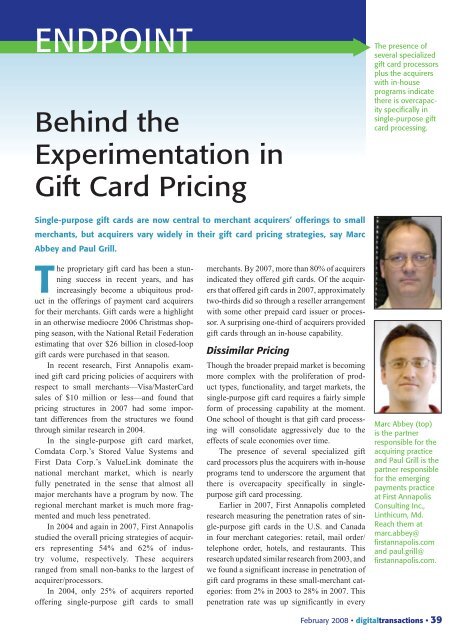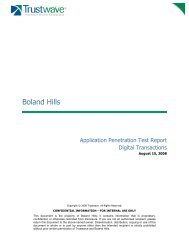The Broken Link - Digital Transactions
The Broken Link - Digital Transactions
The Broken Link - Digital Transactions
Create successful ePaper yourself
Turn your PDF publications into a flip-book with our unique Google optimized e-Paper software.
ENDPOINT<br />
Behind the<br />
Experimentation in<br />
Gift Card Pricing<br />
<strong>The</strong> presence of<br />
several specialized<br />
gift card processors<br />
plus the acquirers<br />
with in-house<br />
programs indicate<br />
there is overcapacity<br />
specifically in<br />
single-purpose gift<br />
card processing.<br />
Single-purpose gift cards are now central to merchant acquirers’ offerings to small<br />
merchants, but acquirers vary widely in their gift card pricing strategies, say Marc<br />
Abbey and Paul Grill.<br />
<strong>The</strong> proprietary gift card has been a stunning<br />
success in recent years, and has<br />
increasingly become a ubiquitous product<br />
in the offerings of payment card acquirers<br />
for their merchants. Gift cards were a highlight<br />
in an otherwise mediocre 2006 Christmas shopping<br />
season, with the National Retail Federation<br />
estimating that over $26 billion in closed-loop<br />
gift cards were purchased in that season.<br />
In recent research, First Annapolis examined<br />
gift card pricing policies of acquirers with<br />
respect to small merchants—Visa/MasterCard<br />
sales of $10 million or less—and found that<br />
pricing structures in 2007 had some important<br />
differences from the structures we found<br />
through similar research in 2004.<br />
In the single-purpose gift card market,<br />
Comdata Corp.’s Stored Value Systems and<br />
First Data Corp.’s Value<strong>Link</strong> dominate the<br />
national merchant market, which is nearly<br />
fully penetrated in the sense that almost all<br />
major merchants have a program by now. <strong>The</strong><br />
regional merchant market is much more fragmented<br />
and much less penetrated.<br />
In 2004 and again in 2007, First Annapolis<br />
studied the overall pricing strategies of acquirers<br />
representing 54% and 62% of industry<br />
volume, respectively. <strong>The</strong>se acquirers<br />
ranged from small non-banks to the largest of<br />
acquirer/processors.<br />
In 2004, only 25% of acquirers reported<br />
offering single-purpose gift cards to small<br />
merchants. By 2007, more than 80% of acquirers<br />
indicated they offered gift cards. Of the acquirers<br />
that offered gift cards in 2007, approximately<br />
two-thirds did so through a reseller arrangement<br />
with some other prepaid card issuer or processor.<br />
A surprising one-third of acquirers provided<br />
gift cards through an in-house capability.<br />
Dissimilar Pricing<br />
Though the broader prepaid market is becoming<br />
more complex with the proliferation of product<br />
types, functionality, and target markets, the<br />
single-purpose gift card requires a fairly simple<br />
form of processing capability at the moment.<br />
One school of thought is that gift card processing<br />
will consolidate aggressively due to the<br />
effects of scale economies over time.<br />
<strong>The</strong> presence of several specialized gift<br />
card processors plus the acquirers with in-house<br />
programs tend to underscore the argument that<br />
there is overcapacity specifically in singlepurpose<br />
gift card processing.<br />
Earlier in 2007, First Annapolis completed<br />
research measuring the penetration rates of single-purpose<br />
gift cards in the U.S. and Canada<br />
in four merchant categories: retail, mail order/<br />
telephone order, hotels, and restaurants. This<br />
research updated similar research from 2003, and<br />
we found a significant increase in penetration of<br />
gift card programs in these small-merchant categories:<br />
from 2% in 2003 to 28% in 2007. This<br />
penetration rate was up significantly in every<br />
Marc Abbey (top)<br />
is the partner<br />
responsible for the<br />
acquiring practice<br />
and Paul Grill is the<br />
partner responsible<br />
for the emerging<br />
payments practice<br />
at First Annapolis<br />
Consulting Inc.,<br />
Linthicum, Md.<br />
Reach them at<br />
marc.abbey@<br />
firstannapolis.com<br />
and paul.grill@<br />
firstannapolis.com.<br />
February 2008 • digitaltransactions • 39







